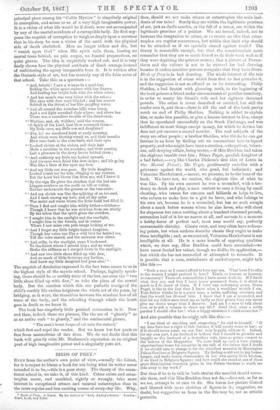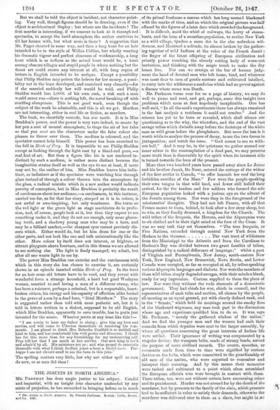BIRDS OF PREY.* EVEN from the author's own point of
view,----usually the fairest, for it is unjust to blame a book for not being what its writer never intended it to be,—this is a poor story. The theory of the sensa- tional school is, we take it, of this kind. Crime exists and catas- trophes occur, and mankind, rightly or wrongly, take more interest in exceptional crimes and unusual catastrophes than in the more regular and less exciting course of every-day life. Why,
• Birds of Prey. A NotreL By the Author of " Lady Audley's Secret." London: Ward, Lek, aud
then, should we not make crimes or catastrophes the main inci- dents of our tales? Surely they are within the legitimate province
of art, just as Jael's murder, or the fall of a tower, are within the legitimate province of a painter. We are bound, indeed, not to increase the temptation to crime, or to create an idea that catas- trophes are regular occurrences, but within that limit why should we be attacked as if we specially sinned against truth ? The theory is reasonable enough, but then the sensationalists must remember that they are as much bound to do their work well as if they were depicting the quietest scenes; that a picture of Prome- theus and the vulture is not to be excused for bad drawing because it makes sensitive persons recogniza that they have livers.
Birds of Prey is in bad drawing. The whole interest of the tale is in the suggestion of crime which from first to last pervades it, and the suggestion is not so offered as to be interesting. Philip
Sheldon, a bad dentist with gleaming teeth, in the beginning of the book poisons a friend under circumstances of peculiar treachery, in order to marry his friend's wife and her eighteen thousand pounds. The crime is never described or asserted, but still the reader sees it, and then—there is till the end of the book pretty much an end of Philip Sheldon. Nothing is added to explain him, or make him possible, or give a human interest to him, except that he speculated successfully on the Stock Exchange, and was
indifferent to most things except money, for which he devises but does not yet execute a second murder. The real subjects of the
story are other people ; a brother Sheldon, who thinks he can get fortune in an hour by finding oat an unconscious heir to lapsed property, and who might have been a creatiou,—thepatieut, labori- ous, self-denying villain, being scarce,— if Miss Braddon had taken the slightest trouble over him ; Diana Paget, goodish daughter of a bad father,—very like Charles Dickens's first idea of Lettie in
Our Mutual Friend ; Mr. Paget, gentlemanly swindler with a
grievance against the world, also good, but indistinct ; and Valentine Hawkehurst, —meant, we presume, to be the hero of the book. We have not, we confess, the slightest idea of what he was like. By his own account he was a scoundrel, with a ten- dency to drink and play, a man content to earn a living by small cheating, who craves for curacoa and billiards as helps to live, who refuses to make love to a girl he loves, and who belongs to his own set, because he is a scoundrel, but has no such scruple about a much better woman whom he also loves, who will cheat for sixpences but cares nothing about a hundred thousand pounds, surrenders half of it for no reason at all, and mounts in a moment a hobby-horse of perfect and, most men would say, perfectly unreasonable chivalry. Cheats exist, and very often have redeem- ing points, but when authors describe cheats they ought to make them intelligible ; and, as we contend, Valentine Hawkehurst is not
intelligible at all. He is a mere bundle of opposing qualities which, we dare say, Miss Braddon could have reconciled—we have never denied her talent, though we dislike its application,—
but which she has not reconciled or attempted to reconcile. It is possible that a man, confederate of card-sharpers, might talk like this :—
"Such a man as I cannot afford to love any one. What have Ito offer to the woman I might pretend to love? Truth, or honour, or honesty, or constancy? Those are commodities I have never dealt in. If I know what they are, and that I have never possessed them, it is about as much as I do know of them. If I have any redeeming grace, Diana Paget, it lies in the fact that I know what a worthless wretch I am. Your father thinks he is a great man, a noble, suffering creature, and that the world has ill-used him. I know that I am a scoundrel, and that let my fellow-men treat me as badly as they please, they can never give me worse usage than I deserve. And am I a man to talk about love, or to ask a woman to share my life ? Good God, what a noble partner I should offer her ! what a happy existence I could assure her !"
And also possible that he might talk like this :— " I am tired of watching and suspecting," be said to himself. "If my dear love has a right to this fortune, it will surely come to her ; or if it should never come, we can live very happily without it. Indeed, for my own part, I am inclined to believe that I should be prouder and happier as the husband of a dowerless wife, than as prince consort to the heiress of the Haygarths. We have built up such a dear, cheery, unpretentious home for ourselves in our talk of the future that I doubt if we should care to change it for the stateliest mansion in Kensington Palace Gardens or Belgrave Square. My darling could not be my house- keeper, and make lemon cheesecakes in her own pretty little kitchen, if we lived in Belgrave Square; and how could she stand at one of those great Birmingham ironwork gates in the Palace Gardens to watch me ride away to my work ?"
But then if he is to talk in both strains the novelist should recon- cile them, and this Miss Braddon does not do,—does not, as far as we see, attempt to or care to do. She leaves her picture blotted and blurred with mere sketches of figures in it ; suggestive, no doubt, but suggestive as faces in the fire may be, not as artistic
portraits. But we shall be told the object is incident, not character-paint- ing. Very well, though figures should be in drawing, even if the object is architectural display ; but where are the incidents ? The first murder is interesting, if we consent to look at it through red spectacles, to accept the lurid atmosphere the author contrives to fill her houses with, but what more is there ? A suggestion that Mr. Paget cheated in some way, and then a long hunt for an heir intended to be in the style of Wilkie Collins, but wholly wanting his dramatic vigour and perfect closeness of workmanship, a long hunt which is as tedious as the actual hunt would be, a hunt among obscure villages and stupid people in whom nothing but the finest art could create any interest at all, with long copies of letters in English intended to be antique. Except a possibility that Philip Sheldon may poison the heiress for her money, a possi- bility not in the least developed, and contrived very clumsily—for if she married suddenly her will would be void, and Philip Sheldon would lose 5,000/. of his own cash, a risk such a man would never run—there is nothing left, the novel breaking off with startling abruptness. This is not good work, even though the subject of the work be admissible, and this is all we get. Murders are not interesting, either in real life or fiction, as murders.
The book, we cheerfully concede, has one merit. It is in Miss
Braddon's power, and the power is very rare indeed, to create by her pen a sort of mental atmosphere, to tinge the air of her tales so that you must see the characters under the false colour she
pleases to throw over them. The medium is coloured, and the spectator cannot help himself. This power has been exercised to
the full in Birds of Prey. It is impossible to see Philip Sheldon except as looking through the light east by a blood-red pane, —a
real feat of art. But then a figure like his is not rendered in- distinct by such a medium, is rather more distinct because the imagination strains itself as well as the eye to see at least, if more may not be, the outline of him. Miss Braddon leaves him indis- tinct, as indistinct as if the spectator were watching him through glass instead of through a colour thrown into the atmosphere by the glass, a radical mistake which in a new author would indicate poverty of conception, but in Miss Braddon is probably the result of carelessness about her audience,—a carelessness, in this instance, carried too far, so far that her story, steeped as it is in colour, is not awful or awe-inspiring, but only wearisome. She turns on
the red light. or the green light as stage machinists do in profu-
sion, and, of come, people look at it, but then they expect to see something under it, and they do not see enough, only some gleam- ing teeth, and a shadowy young man who may be a hero, and may be a billiard marker,—the sharpest eyes cannot precisely dis- cern which. Either would do, but let him dress for one or the other parts, and not look like one and talk unintentionally like the other. Mere colour by itself does not interest, or frighten, or attract playgoers above fourteen, and in this drama we are allowed to see nothing else. The light is finely managed, we admit, but after all one wants light to see by.
The power Miss Braddon can exercise and the carelessness with
which in this story she has chosen to exercise it, are curiously shown in an episode inserted within Birds of Prey. In the hunt
for an heir some old letters have to be read, and they reveal with wonderful force a strange household, a hard but good Wesleyan woman, married to and loving a man of a different stamp, who has been a roisterer, perhaps a criminal, but is a respectable, heart- broken citizen, his energy and his capacity of affection alike buried
in the grave of a son by a dead love, " littel Matthew." The story is suggested rather than told with most pathetic art, but it is told in letters written in a dialect, supposed to be old English, which Miss Braddon, apparently to save trouble, has in parts just invented for the nonce. Whoever:note at any time like this?— "I am sorrie to hear my father is aleing ; give him my love and servise, and will come to Ullerton immediate on receiving his com- mands. I am plesed to think Mrs. Rebecka Caulfeld is so dutifull and kind to him, and has comfortedd him with prairs and discorses. I thank her for this more than for any friendshipp for my undeserving self. Pray tell her that I am ranch at her servise. Our new king is lov'd and admied by all. His ministers not so ; and wise peopel do entertain themselfs with what I think foolish jokes a-bout a Skotch boote. Per- happs I am not eleverr ennff to see the farm in this joke."
The spelling matters very little, but why not either spell as men do now, or as men did then?



































 Previous page
Previous page